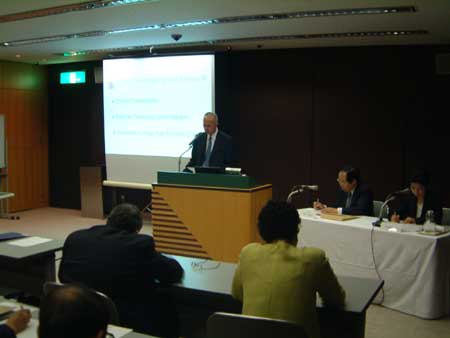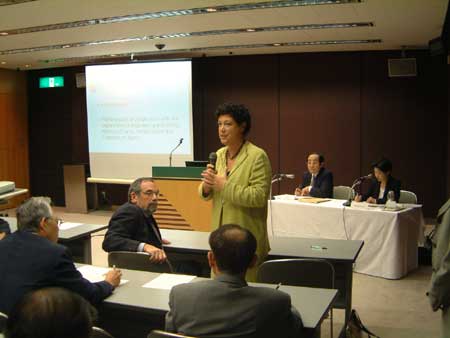|
Exchange of Opinions with NHTSA |
| *Date and Time: | ||
| Sept. 16, 2003 (Tuesday) from 4:00 to 5:30 p.m. | ||
| *Place: | ||
| Tokyo International Forum | ||
| *Attendants from NHTSA: | ||
| Mr. Ronald Medford Senior Associate Administrator for Vehicle Safety, NHTSA Ms. Jacqueline Glassman Chief Council, NHTSA Mr. Kenneth N Weinstein Associate Administrator for Enforcement, NHTSA |
||
| Mr. Medford of the NHTSA gave a lecture entitled "An
Overview of the NHTSA's Major Vehicle Safety Activities." After
the lecture, active exchanges of opinions continued concerning the
future trends and harmonization of safety standards. Synopsis of Dr. Runge's Talk "The NHTSA is concerned with the current circumstances and continued studies of (1) compatibility, (2) roll-over prevention and protection, (3) fuel regulations, and (4) the harmonization of global vehicle safety standards. In addition to passenger vehicles, an increase in the number of light trucks, vans, and utility vehicles (LTVs) over the past ten years has seen a rise in the number of accidents involving vehicles in this category. As a result the NHTSA collected information and studied the compatibility of passenger vehicles and LTVs. The Integrated Project Team (LPT) report on Vehicle Compatibility was subsequently published in the Federal Register. Vehicle compatibility will hence include problems related to the lights, crash experiments, and fuel economy. Consideration is being given to amendments of the regulations. Another problem that concerns the NHTSA is rollover crashes in passenger vehicles, LTVs and SUVs. Higher safety belt use rates are necessary to reduce the number of the killed and injured due to these accidents. At the same time, the NHTSA is taking regulatory actions to revise FMVSS206 in order to improve door latches and upgrade FMVSS216 to increase protection against roof collapse by addressing vehicle structure problems. Our study on regulating fuel economy also identified possible substantial effects on vehicle safety and other consequences. We plan to seek public comments on the Corporate Average Fuel Economy (CAFE) Program. Global Technical Regulations (GTRs) under the 1998 Global Agreement are being prepared in cooperation with Europe and Japan for the harmonization of global vehicle safety standards. The NHTSA will be responsible for promoting several areas of high priority including child safety seats, door latches, and head restraints. We will continue to support the trilateral approach being taken by Japan, the United States and Europe in the important area of global standards harmonization." |
||
  |